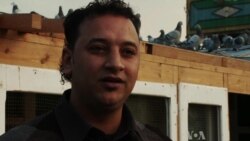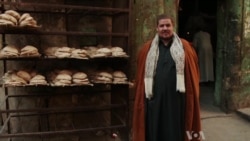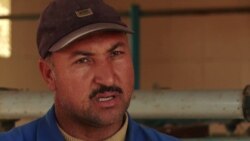CAIRO —
Two years after their historic uprising, many Egyptians, from intellectuals to the working class, are reflecting on what has been gained since the heady days on Tahrir Square and what still needs to be done.
For Ehab Gohar, who raises pigeons on a rooftop in a Cairo suburb, the biggest gain has been freedom of speech. He can stand up, he said, "and tell the president, 'Your people need this. Your people need that.'"
It's a seismic shift that novelist Alaa el Aswany first saw when he joined the millions who poured out onto Egypt's streets during the uprising.
"The human change," he said, is the most important part of the revolution. "The people overcame the barrier of fear. This is irreversible."
But some people are afraid the revolutionary spirit is in danger. For them, the ascendancy of Islamist politicians spells trouble and division.
A former Muslim Brotherhood leader, Mohamed Morsi, was elected president in June, and helped Islamist lawmakers push through a controversial constitution approved in December.
The previous authorities had detained Morsi for his participation in the Tahrir protests in January 2011, and he regularly invokes the spirit of the uprising. Decrees granting himself temporary sweeping powers late last year were made, he said, to preserve and protect the revolution.
Some doubts
Among the doubtful is riverboat captain Mustafa Siam. Sitting at the rudder of his traditional sailboat, or felucca, along the banks of the Nile in Cairo, he worried the Brotherhood is too concerned with its own interests.
Siam said he's Muslim, "but whoever is responsible for the country," he said, "should be Egyptian, not just Muslim." He said that whether one is Muslim, Christian or Jewish, the important thing is to be devoted to the country.
The government's failure to deliver on early promises of quick fixes to many of the nation's woes has others wondering about priorities.
Two devastating train crashes took dozens of lives in recent months, including those of more than 50 children. Buildings collapse, power fails, prices rise and unemployment grows.
Novelist el Aswany, a critic of the Brotherhood, said that after decades of being banned and remaining on the outside, the group must now take responsibility.
"I think this is very useful for the revolution," he said. "I do not think it is useful for the Brothers." He said their popularity is waning, something he thought would take 10 years. But many, he said, are turning away after only 10 months.
The insular nature of Brotherhood ideology is part of the problem, Aswany said. Most autocrats take decades to become isolated from the people, he said, adding, "for the first time, I see somebody begin with this problem."
Morsi defended
Yet many others show patience with Morsi. They point to his promises to tackle such basic issues as traffic and garbage collection, as well as broader economic concerns and Egypt's regional and international role.
At a bakery in Cairo, Ashraf al Husseini said his business is struggling, but that he is sympathetic to Morsi.
"The government is unlucky," he said, "because it took responsibility in a time of chaos and economic collapse." He said, "the Brotherhood government" is working hard to overcome the challenges.
The Islamist group also remains Egypt's best-organized political movement, able to quickly mobilize hundreds of thousands of followers to hold counter-demonstrations in support of the government.
It also has been able to work with more conservative Islamists, most notably fundamentalist Salafis, despite underlying tensions that occasionally surface between the two.
In contrast, the opposition, many of them the ones who took to Tahrir Square two years ago, have yet to coalesce into a strong political force.
El Aswany defends the disunity, arguing that the opposition is fragmented by definition - rejecting the dictates of anyone, and thinking for themselves.
But the novelist said time is on their side. He said it took France and America years to go through their revolutions.
"If we expect the revolution to make real change in a couple of years," he said, "it means simply we did not read enough about the history of revolutions."
For Ehab Gohar, who raises pigeons on a rooftop in a Cairo suburb, the biggest gain has been freedom of speech. He can stand up, he said, "and tell the president, 'Your people need this. Your people need that.'"
It's a seismic shift that novelist Alaa el Aswany first saw when he joined the millions who poured out onto Egypt's streets during the uprising.
"The human change," he said, is the most important part of the revolution. "The people overcame the barrier of fear. This is irreversible."
But some people are afraid the revolutionary spirit is in danger. For them, the ascendancy of Islamist politicians spells trouble and division.
A former Muslim Brotherhood leader, Mohamed Morsi, was elected president in June, and helped Islamist lawmakers push through a controversial constitution approved in December.
The previous authorities had detained Morsi for his participation in the Tahrir protests in January 2011, and he regularly invokes the spirit of the uprising. Decrees granting himself temporary sweeping powers late last year were made, he said, to preserve and protect the revolution.
Some doubts
Among the doubtful is riverboat captain Mustafa Siam. Sitting at the rudder of his traditional sailboat, or felucca, along the banks of the Nile in Cairo, he worried the Brotherhood is too concerned with its own interests.
Siam said he's Muslim, "but whoever is responsible for the country," he said, "should be Egyptian, not just Muslim." He said that whether one is Muslim, Christian or Jewish, the important thing is to be devoted to the country.
The government's failure to deliver on early promises of quick fixes to many of the nation's woes has others wondering about priorities.
Two devastating train crashes took dozens of lives in recent months, including those of more than 50 children. Buildings collapse, power fails, prices rise and unemployment grows.
Novelist el Aswany, a critic of the Brotherhood, said that after decades of being banned and remaining on the outside, the group must now take responsibility.
"I think this is very useful for the revolution," he said. "I do not think it is useful for the Brothers." He said their popularity is waning, something he thought would take 10 years. But many, he said, are turning away after only 10 months.
The insular nature of Brotherhood ideology is part of the problem, Aswany said. Most autocrats take decades to become isolated from the people, he said, adding, "for the first time, I see somebody begin with this problem."
Morsi defended
Yet many others show patience with Morsi. They point to his promises to tackle such basic issues as traffic and garbage collection, as well as broader economic concerns and Egypt's regional and international role.
At a bakery in Cairo, Ashraf al Husseini said his business is struggling, but that he is sympathetic to Morsi.
"The government is unlucky," he said, "because it took responsibility in a time of chaos and economic collapse." He said, "the Brotherhood government" is working hard to overcome the challenges.
The Islamist group also remains Egypt's best-organized political movement, able to quickly mobilize hundreds of thousands of followers to hold counter-demonstrations in support of the government.
It also has been able to work with more conservative Islamists, most notably fundamentalist Salafis, despite underlying tensions that occasionally surface between the two.
In contrast, the opposition, many of them the ones who took to Tahrir Square two years ago, have yet to coalesce into a strong political force.
El Aswany defends the disunity, arguing that the opposition is fragmented by definition - rejecting the dictates of anyone, and thinking for themselves.
But the novelist said time is on their side. He said it took France and America years to go through their revolutions.
"If we expect the revolution to make real change in a couple of years," he said, "it means simply we did not read enough about the history of revolutions."
Loading timeline...
















